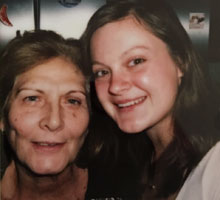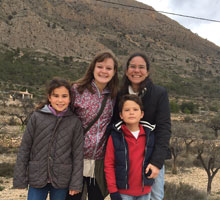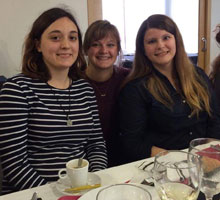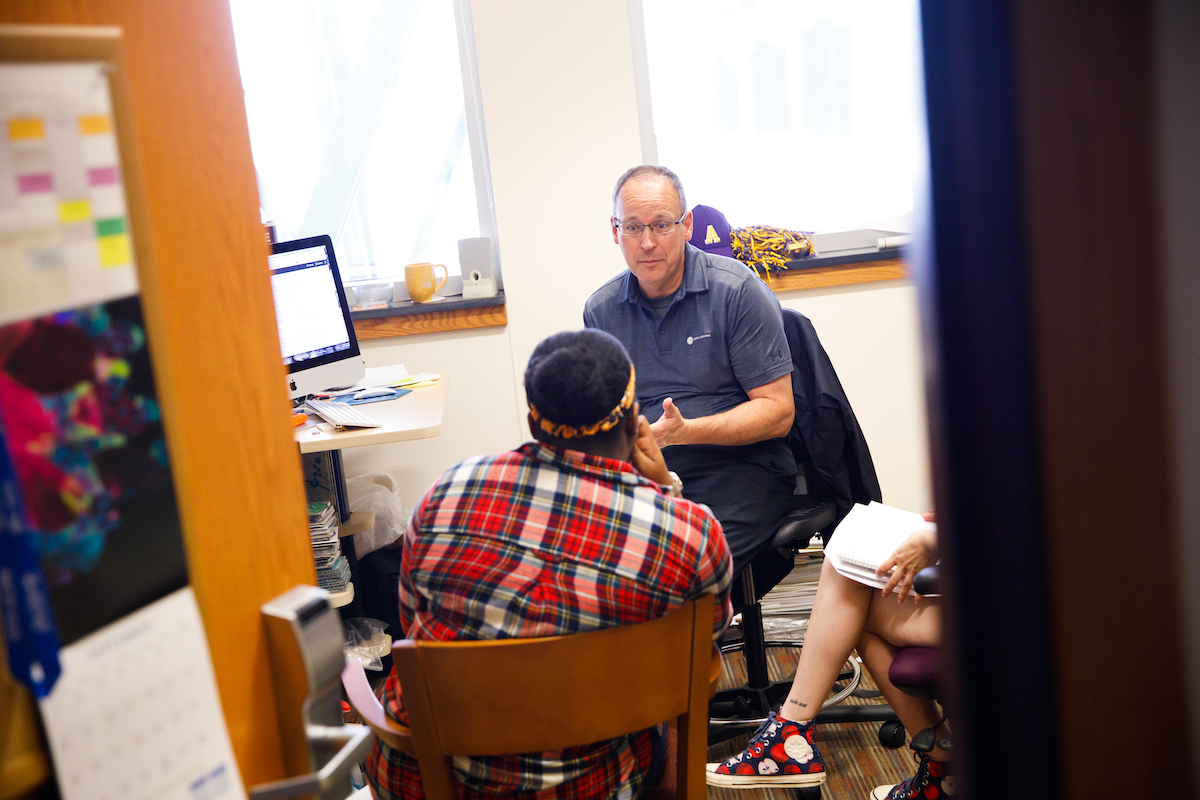Kailey Henderson, ’18: One Semester in Spain, Three Roles
December 9, 2016
Kailey Henderson, ’18, has spent the fall 2016 semester in an intensive Spanish language and culture studies program at the University of Alicante in Spain. She shares her thoughts and insights about her study-abroad experience below.
Role 1: La Hija (The Daughter)

Henderson with her host mother, Dolores.
I live in an apartment with Dolores, who is retired and likes to joke that I am her current job. She cooks for me, does my laundry and cleans up after me. Dolores is the epitome of a “traditional” Spanish mother, or what some Spaniards would call “the queen of the house.”
Dolores is protective, curious, stubborn and strict. I am not accustomed to living in a household like hers. I am not allowed to touch anything without her permission, and I can only shower during certain times of the day. When I leave I have to tell her where I am going, who I am going with, and what time I will be back. Most importantly, I absolutely have to take her advice on everything (what to wear, what to pack for trips, what to eat, what to do with my free time, etc).
Due to her curious and protective nature, I also have no sense of privacy. She enters my room about every five minutes to see what I’m doing. When I FaceTime my parents or my friends, she always tries to insert herself into the conversation—even though she knows no English. She looks over my shoulder while I book train tickets and flights for weekend trips, making sure I take her advice on appropriate departure and arrival times. She even makes me read my homework assignments aloud to her so she knows what I’m learning.
The best thing about Dolores is that she considers me a part of her family. She introduced me to her children, her grandchildren, her neighbor and her best friend. Dolores and I sing together, chat during meals, watch a game show together every night called Pasapalabra and tease each other to no end. Dolores “surprises” me with chocolate every night after dinner, and even bought me slippers and a coat for the winter.
Within such a short time Dolores has become one of the most important people in my life. Tears form in my eyes every time I think about having to say goodbye at the end of December, because now I cannot imagine my life without her.
Role 2: La Tutora (The Tutor)

Henderson (back left) with her tutoring family.
My program, Spanish Studies Abroad, offers the extracurricular opportunity to be an English tutor for a family. I quickly signed up because I love working with children and have a lot of experience as a tutor already. I am matched with an adorable family with two kids. The family lived in New York for a year, so they speak a fair amount of English.
I thought that my role would be to help the kids practice their English, but I quickly came to discover that the parents care more about their kids having fun than how fluent they are in English. Instead of handing them worksheets or practicing English vocabulary, I treat my tutoring sessions kind of like I am their English babysitter. We make crafts, we paint and draw, we play soccer, we play games like Uno or Jenga, and we speak in English the entire time. I believe that showing is better than telling, so when I hear them mispronounce a word or mix up the syntax of a sentence, I correct them through my response instead of telling them they were wrong. They are quick learners, and their English has improved a lot just by listening to me speak with them.
Role 3: La Estudiante (The Student)

Henderson (center), pictured here with her Spanish-speaking partners in Alicante, is majoring in Spanish education and minoring in English education. The native of Glen Ellyn, Ill., has a concentration in the Fritz Shurmur Center for Teacher Development secondary certification program and is a member of the Prentiss M. Brown Honors Program.
I also took advantage of my program’s Spanish partner extracurricular opportunity. We are only required to attend a few mandatory events together, but my partner (a University of Alicante student) and I have become very close, and we get together for lunch each week. I ended up adopting a second Spanish Speaking Partner, so now I hang out with both to practice my Spanish and teach them a little English.
My partners invited me to see the premiere of Fantastic Beasts and Where to Find Them. I was so excited to go to the movie with them because it felt like I was a normal university student seeing a movie with her cool Spanish friends. I was even more excited to discover that I understood most of the movie, even though it was voiced-over in Spanish.
Before I arrived in Alicante I was very confident in my Spanish-speaking ability, having taken nine years of Spanish. When I arrived, I was overwhelmed by the unfamiliarity of the accent and the rapidness of which the Spanish speak. Every time I opened my mouth to say something in Spanish, my face burned with shame because I knew I would soon be corrected by either my professors or by Dolores. However, I forced myself to speak in Spanish as often as I could, and after an embarrassing first month I found I could converse with ease.
There are times when I still stumble over my words, or conjugate incorrectly, or forget a vocabulary word entirely, but I also often find myself thinking in Spanish, or imitating common expressions I hear around me, or reacting to a situation in Spanish the way Dolores would.
Now, I have a new understanding of the Spanish language. I have heard the colloquial terms, the slang, the jokes, the playing with words. Now, I can connect the language to the culture of the Alicantinos, and see how the usage of the Spanish language changes depending on the culture of where it’s being spoken. Studying Spanish and living in a Spanish-speaking country are two different things entirely, and I cannot stress enough how important it’s been for me to spend this past semester in Spain.
